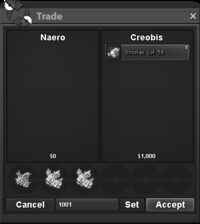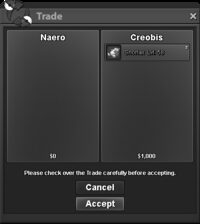Trading is the transactional (or temporary) process of exchanging commodities between players. Pokémon and Pokédollars can be exchanged between players, as well as a select assortment of items.
Contingent that all trading requirements (read below) are met between the exchangees, trading can be executed in any Pokémon Center.
Since obedience is not programmed into PRO (Pokémon Revolution Online), traded Pokémon will unconditionally obey you irrespective of your badge count; however, traded Pokémon will still have their happiness points reset to 70—the starting baseline of happiness points for newly obtained Pokémon.
Trading can also be done with a select assortment of NPCs.
As of August 3, 2018, you can also now participate into the temporary Pokémon exchanges which is now known as Lending.
Requirements
The Rainbow Badge—the fourth Kanto badge in its successional line of gyms—is required before you can trade; once that has been procured, you can trade in any Pokémon Center with another player who has satisfied the same requirement. Only that badge will be required throughout your regional progression, meaning that you will be able to trade in the immediacy of arriving in Kanto’s successive region in Johto, for example.
The Pokémon that you trade must have been caught in the region that your operative Pokémon Center is in; for example, if a Rattata were caught in Johto, you would not be able to trade it in a Kanto Pokémon Center.
Trading process

The first trade window.

The second trade window, which serves as the last confirmatory prompt before the trade is complete.
Executing a trade
The trading process is very simple and can be itemized in these-four steps.
- Convene in the same Pokémon Center with the other player that you wish to trade with.
- Initiate a trade request; this can be done by the /trade username command or by right-clicking on them and selecting the trade option.
- When the trade window is opened, click on your Pokemon on it to offer them and insert the Pokédollar quantity that you wish to trade (if applicable to the negotiation). You can hover over the offered Pokémon to examine its Pokémon card, including their stats and held item (if any). Once you have offered all the Pokémon and/or Pokédollars desired and while the other player has offered their end of the stipulation, click on ‘Accept.’
- Once both of you have accepted the initial trade window, you will proceed to the second screen. Double-check to ensure that the trade is arranged as intended before accepting this trade window, because you will not be able to undo the trade; that will be the finality of it.
Item-trading
Items can now be traded directly, after the update on the 26th of December, 2018; they can either be equipped to the Pokémon, as Pokémon are used as vehicular conveyors for item-trading here,or simply traded from the Inventory solely. When traded, the Pokémon will still retain its held item, thereby allowing its recipient to extract the item for their personal usage.
For this process, you are disadvised from using a valuable Pokémon to equip the item; this can be a lead-up to a scam depending on how coveted that Pokémon is. It would be more judicious and secure to use a throwaway Pokémon as an item-holding placeholder in the trade.
Not all items are tradable, and a fast confirmatory check can be done by attempting to equip the item in question to a Pokémon or by trying to trade it on its own; if no system message appears, then it is tradable.
Coin-trading
Main article: Coin Shop
Coins—the currency of the Coin Shop—are not directly tradable; they must be stowed away in a Coin Capsule, which is purchasable on the aforementioned shop for 100 Coins, in order for them to be alienable to other players. Because 100 Coins are rigidly stored in this container upon purchase, coins can only be traded in increments of 100 per trade, and this capacity is not fluctuable; you can not remove any from it, nor can you store in new ones.
Lending
Newly implemented on August 3, 2018, the Lending System is a new approach to give players the ability to confer a Pokémon to an exchangee under a set appointed time given by the exchanger which provides all users a secure way to borrow things from other players. After the appointed time set finishes, the Pokémon is soon returned back to the exchanger from the exchangee’s account without question.
The lending process is exactly the same to using the regular trading system, by using the common trade command.
An example of the command being used will be provided below.
/trade username
Please note, while lending…
- Time of the trade can now be assigned while being on the Trade window. To set a timer, click on ‘Lend’. The minimum the timer can be set at is 1 minute, while the maximum is 30 days, 23 hours and 59 minutes. After selecting the time, click on ‘✓’ to confirm it. Make sure you read the warning(s) afterwards!
- You can now cancel the process early after finishing the lending process by pressing on ‘Send back now’, shown at the Pokémon Card. Remaining time will also be shown, reverse-counting in real time.
- You can not trade already borrowed Pokemon.
- If the exchangee’s account gets suspended, the Pokémon you granted will still return at the set appointed time.
- Server transfers requests will not be processed by staff if you have borrowed or lended a Pokémon during that time.
- Make sure you do not have a full team of borrowed Pokémon as, in the case if they are returned, you will not have a team.
- If your PC Box is full, make sure to delete one Pokémon to make room for the returned Pokémon in question. Lended Pokemon returned will never be lost.
Trade Evolutions
Methodically the same as the handheld games, the same trade-triggered evolutions carry over here.
Because these evolutions are multi-transactional in the sense that you are trusting the other party to trade the Pokémon back to you, you must be circumspect about who you are trading with lest they steal your Pokémon. To be on the cautious end, try to strictly trade trusted friends, reputable traders, staff members.
If you wish to register the evolved-data entry of the Pokémon that you are trading for, ask the trader to decline on the evolutionary prompt so that you can evolve it yourself when they trade you it back.
|
Trade-Evolved Pokémon
|
||||
| Pokémon | Held Item | Evolution | ||
|---|---|---|---|---|
|
|
Poliwhirl |
|
Politoed | |
|
|
Kadabra |
None |
Alakazam | |
|
|
Machoke |
None |
Machamp | |
|
|
Graveler |
None |
Golem | |
|
|
Slowpoke |
|
Slowking | |
|
|
Haunter |
None |
Gengar | |
|
|
Onix |
|
Steelix | |
|
|
Rhydon |
|
Rhyperior | |
|
|
Seadra |
|
Kingdra | |
|
|
Scyther |
|
Scizor | |
|
|
Electabuzz |
|
Electivire | |
|
|
Magmar |
|
Magmortar | |
|
|
Porygon |
|
Porygon2 | |
|
|
Porygon2 |
|
Porygon-Z | |
|
|
Feebas |
|
Milotic | |
|
|
Dusclops |
|
Dusknoir | |
|
|
Clamperl |
|
Huntail | |
|
|
Clamperl |
|
Gorebyss | |
|
|
Boldore |
None |
Gigalith | |
|
|
Gurdurr |
None |
Conkeldurr | |
|
|
Karrablast |
None |
Escavalier | |
|
|
Shelmet |
None |
Accelgor | |
|
|
Spritzee |
|
Aromatisse | |
|
|
Swirlix |
|
Slurpuff | |
|
|
Phantump |
None |
Trevenant | |
|
|
Pumpkaboo |
None |
Gourgeist |
Scams
Rules and Implications
Any violations of trade-related rules may result in a trade ban—an antecedent punishment for trade-related offenses that allows the offender to play but disables their ability to trade with others for its duration—or more severe punishments as totalized by the offender’s prior track record, the severity of the trade offense, and aggravating circumstances.
Trade Moderators (known shortenedly as T-MODs) are the primary rule-enforcers of all trade-related rules; as such, they will assess disciplinary action for any rule violations, as well as abdicating trade disputes.
Avoiding Scams
Scams can be staved off through a combination of vigilance, proaction and wariness. While you will always be susceptible to a scam to an extent as long as you routinely exercise this gameplay feature, there are many perfunctory safeguards that you can practice to reduce the amplitude of the risk greatly. Yourself is the greatest bulwark against scams, so be selective of who you trade with and the avenues thereof, as well as heeding to the protips below.
- Be attentive to the trade screen. As simple as this is, it is a pitfall that many have fallen into—partly attributable to the complacency attitude.
- Be wary of who you are trading with. Examine their player card to see how long they have been around (a possible correlator of their reputability). Also, try to survey the forums for reputable traders, since many of them will be found on that medium—especially recommendable for daycaring negotiations.
- For multi-step transactions, such as when a middleman is needed to trigger evolutions, try to only trade trusted friends or staff members. If you want to exercise an airtight threshold of caution, you can use an alternative account to trade; this is lawful, as there are no direct rules against multi-accounting at this time.
- Log all proof of the trade agreement in case you need to furnish a scam report. Do not consider this a safety net for a potential scam; still be precautious about your trades, because there is no guarantee that your lost Pokémon and/or items can be restituted!
Reporting Scams
In the event that you feel that a scam has occurred, you should first try to discuss it with the alleged offender; for all you know, there is a chance that miscommunication could have happened. If they persistently refuse to comply with the original trade agreement or if they appear to be unreasonably avoidant of you, you should furnish a scam report on the Report Center section of the forums.
You should provide evidence of the trade agreement, such as screenshots of the negotiatory conversation or linking to the forums thread it was brokered on; otherwise, staff will not have substantive context to the allocation of your lost assets if they lack evidentiary material. Proof of the trade transaction is not categorically required, as staff have access to all trade logs; however, providing it will assist their job in pinpointing the exact trade.
Please bear in mind that it is not always feasible for your lost Pokémon to be recovered; this is because various complications can arise, such as if the scammer were to trade the Pokémon to an ingenious party; if that were the case, it would be unethical to yank the Pokémon out of their possession if they lawfully traded for it.